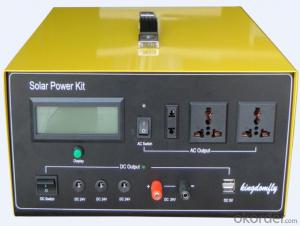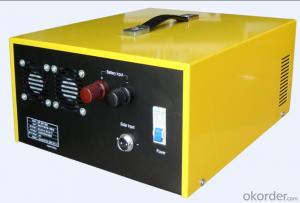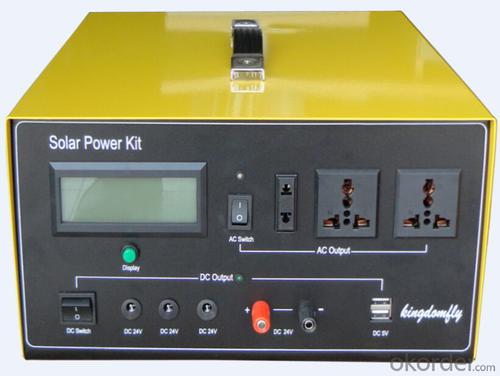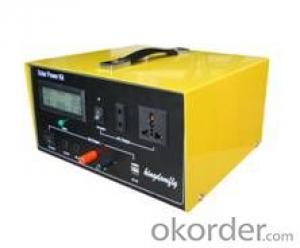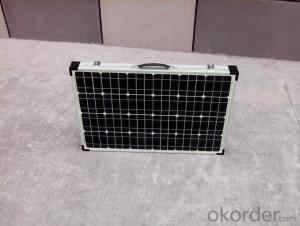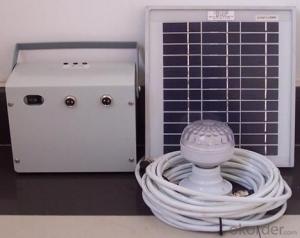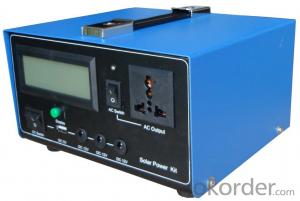Solar Energy Systems Indiana - Home Solar Power System SPK_1000
- Loading Port:
- China main port
- Payment Terms:
- TT OR LC
- Min Order Qty:
- 3 pc
- Supply Capability:
- 10000 pc/month
OKorder Service Pledge
OKorder Financial Service
You Might Also Like
Main Information
KDF SPK_1000 This product is high performance,family used portable solar power system,which can receive energy and store it in battery outside connected to SPK by solar energy on sunny day,and supplies electric power for varies appliances such as electric fan,lighting lamps, television, portable computer etc.It can supply power for both DC and AC electric application .It’s very helpful and useful for home electric supply.
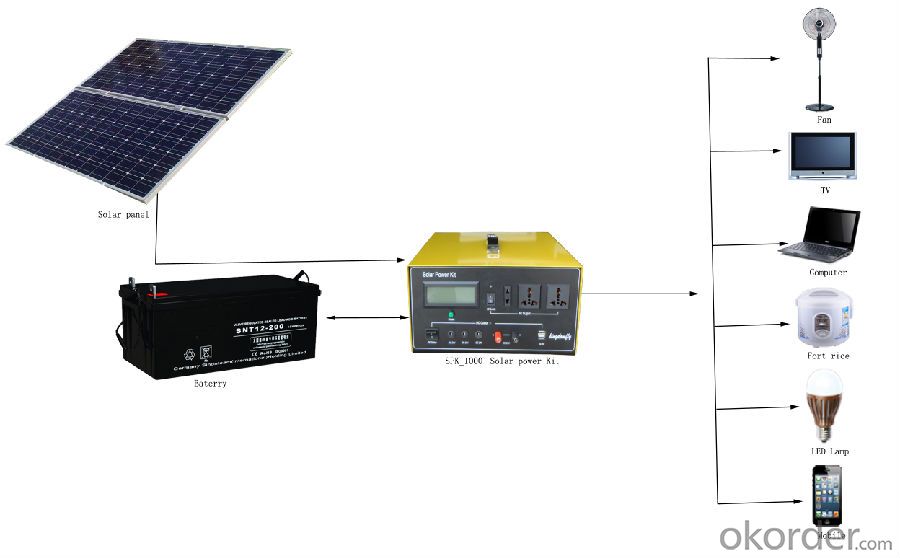
Features:
◆ Battery puts outside connected to the SPK for user to choose battery in recommended range, and easily to exchange battery.
◆ Both DC and AC output
◆ Solar Feedback Circuit Protection
◆ Output Short-circuit Protection
◆ Solar「+」「-」anti-access protection
◆ Output「+」「-」anti-access protection
◆ Over Charged Protection
◆ Over Discharged Protection
◆ Over Load Protection
◆ Over-Temperature Protection
Technical parameters
Specification | Value/Material | |
Item No. KDF | SPK_1000 | |
Solar Recommended | Specification | Poly silicon |
Working Voltage/Power | 36V/80W~500W | |
Battery Recommended | Rated Voltage/Capacity | 24V50AH~200AH |
Cycle Number | 80% Deep Cycle Number:500 70% Cycle Number:800 | |
Working Temperature | Short Period(one Month):-20~50℃Long Period(Six Months):-10~45℃ | |
Charging Controller | Operating Voltage | 24V |
Input Voltage | 34.6V~42V | |
Input current | MAX:20A | |
Power Consumption | MAX: 15mA | |
Low Voltage Disconnect(LVD) | 21.6V | |
Low Voltage Reconnect(LVR) | 24.6V | |
High Voltage Discharge( HVC) | 29.2V | |
High Voltage Recharge(HVR) | 27.6V | |
Temperature Protection | 60℃ | |
DC Output | DC output & Application | USB 5V2A |
DC output & Application | DC 24V | |
AC Output | Output Wave | Modified sine wave |
Input Voltage | 22V~30V | |
Output Voltage | 220V±10% | |
Output Frequency | 60Hz±2Hz/50Hz±2Hz | |
Rated Output Power | 1000W | |
Maximum VA | 2000VA | |
Maximum Efficiency | 88% | |
Temperature | 0-40℃ | |
Over Temperature | 60℃~70℃ | |
Low Voltage Alarm | 22V | |
Low Voltage Shut off | 21V | |
High Voltage Shut off | 30V | |
Package | Set size | 350*449*227mm |
Set N·W | 7.2kg | |
Set N·W | 5.2kg | |
LCD_Display
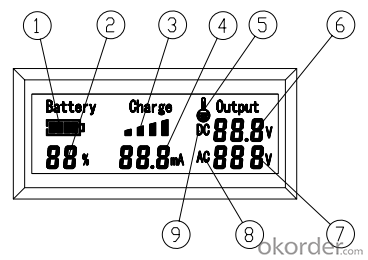
No. | Name | Function |
1 | Battery Icon | To show the Volume of the Battery |
2 | Date of % | To show the percent of the Battery |
3 | Charging Icon | To show the charging condition |
4 | Current | To show the value of charge current |
5 | Temperature Icon | Temperature Alarm |
6 | Date of Voltage | To Show the Value of DC output voltage |
7 | Date of Voltage | To Show the Value of AC output voltage |
8 | AC Icon | AC output |
9 | DC Icon | DC output |
- Q: What is the role of solar energy systems in reducing noise pollution?
- Solar energy systems play a significant role in reducing noise pollution as they operate silently without the need for any mechanical parts or combustion. Unlike traditional energy sources like generators or power plants, solar panels generate electricity through the absorption of sunlight, eliminating noise emissions. This not only provides a quieter and more peaceful environment for nearby communities but also has a positive impact on wildlife, reducing disturbances caused by loud machinery or industrial processes.
- Q: Do solar energy systems require a battery for storage?
- No, solar energy systems do not necessarily require a battery for storage.
- Q: Are there any fire risks associated with solar energy systems?
- Yes, there are fire risks associated with solar energy systems, although they are relatively low compared to other energy sources. The most common fire risks include electrical malfunctions, such as faulty wiring or connectors, and overheating of components. However, modern solar systems are designed with safety measures, such as built-in fire barriers and automatic shut-off mechanisms, to minimize these risks. Regular maintenance and inspections by qualified professionals can further reduce the chances of fire incidents.
- Q: Are there any tax credits available for installing a solar energy system?
- Installing a solar energy system grants access to tax credits. The federal government provides the Solar Investment Tax Credit (ITC), enabling homeowners and businesses to deduct a portion of the installation cost from their federal taxes. The ITC currently offers a 26% tax credit for systems installed until the end of 2022. However, it is crucial to note that starting in 2023, the tax credit will decrease to 22% and exclusively apply to commercial installations. Moreover, certain states extend their own tax incentives for solar energy systems, such as tax credits, rebates, or exemptions. It is advisable to consult your state or local government to determine the availability of specific tax credits in your area.
- Q: Can solar energy systems be used in residential areas with homeowners associations?
- Yes, solar energy systems can be used in residential areas with homeowners associations (HOAs). However, the specific rules and regulations regarding solar energy systems may vary depending on the HOA. Some HOAs may have restrictions on the size, type, and placement of solar panels, while others may have specific guidelines in place to ensure aesthetic and architectural harmony within the community. In the United States, the federal government has enacted legislation to protect homeowners' rights to install solar energy systems, including within HOAs. The Solar Rights Act, signed into law in 1978, prohibits HOAs from outright banning the installation of solar energy systems. However, HOAs are allowed to impose reasonable restrictions to protect the community's overall aesthetics and property values. If you live in a residential area with an HOA and are interested in installing a solar energy system, it is important to review the HOA's guidelines and restrictions. Many HOAs have specific processes and procedures for homeowners to follow when seeking approval for solar panel installations. This may involve submitting a design proposal, obtaining necessary permits, and complying with any architectural or aesthetic requirements. It is also worth noting that solar energy systems can offer various benefits for homeowners and the community as a whole. They can reduce electricity costs, increase property values, and contribute to a cleaner and more sustainable environment. With the increasing popularity and affordability of solar energy, many HOAs are becoming more receptive to solar panel installations and are updating their guidelines to accommodate them. If you are considering installing a solar energy system in a residential area with an HOA, it is recommended to consult with the HOA board, review the guidelines, and work with a reputable solar installation company that has experience navigating the requirements of HOAs. By following the proper procedures and working within the guidelines, it is possible to enjoy the benefits of solar energy while maintaining harmony within the residential community.
- Q: Do solar energy systems require a backup power source during outages?
- No, solar energy systems do not require a backup power source during outages. Solar panels generate electricity from sunlight and can continue to provide power even when the grid is down. However, if the solar system is grid-tied, it may shut down automatically during an outage to prevent sending electricity back to the grid, in which case a backup battery or generator can be used to provide power.
- Q: How do solar energy systems affect the environment?
- Solar energy systems have a positive impact on the environment as they produce clean and renewable energy, reducing greenhouse gas emissions and air pollution. They also conserve water resources and do not generate any noise pollution. Additionally, solar panels require minimal maintenance and have a long lifespan, making them a sustainable and eco-friendly energy solution.
- Q: Can solar energy systems be installed in areas with heavy snowfall?
- Yes, solar energy systems can be installed in areas with heavy snowfall. However, it is important to consider the impact of snow on the system's performance and take necessary precautions during installation. Snow can temporarily reduce the amount of sunlight reaching the solar panels, which in turn reduces their energy production. However, the panels are designed to have a tilt and smooth surface, allowing snow to slide off easily. Additionally, advancements in technology have led to the development of snow-resistant solar panels that are more effective at converting sunlight into electricity even in snowy conditions. It is also worth noting that solar panels are often mounted at an angle to maximize their exposure to the sun, which helps to minimize snow accumulation. Overall, while heavy snowfall may impact the efficiency of solar energy systems, they can still be successfully installed and can contribute to renewable energy generation in areas with such climatic conditions.
- Q: Can solar energy systems be used in powering concert halls or auditoriums?
- Yes, solar energy systems can certainly be used to power concert halls or auditoriums. The use of solar energy in large venues like concert halls and auditoriums has become increasingly popular due to its numerous benefits. Solar panels can be installed on the roof or surrounding areas of the venue to capture sunlight and convert it into electricity. This renewable energy source can then be used to power all the electrical equipment and lighting systems within the concert hall or auditorium. One of the main advantages of using solar energy systems in these venues is the potential cost savings. Concert halls and auditoriums often consume large amounts of electricity, particularly during events and performances. By harnessing solar power, these venues can significantly reduce their dependence on the traditional power grid and lower their energy bills. Additionally, solar energy systems require minimal maintenance once installed, which further contributes to the long-term cost-effectiveness. Moreover, integrating solar energy into concert halls and auditoriums aligns with the growing global focus on sustainability and reducing carbon footprints. By utilizing renewable energy sources like solar power, these venues can significantly decrease their greenhouse gas emissions and promote a more environmentally friendly approach to energy consumption. This not only benefits the venue itself but also contributes to the overall sustainability goals of the local community and society as a whole. However, it is important to consider that the size and power requirements of concert halls and auditoriums may require a significant investment in solar panels and associated equipment. The venue's energy demand, the available space for installation, and the local climate are all factors that need to be assessed during the planning stage. It is crucial to ensure that the solar energy system is properly sized to meet the energy needs of the venue and that it is designed to withstand the specific weather conditions of the location. In conclusion, solar energy systems can indeed be used to power concert halls or auditoriums. The benefits of using solar power in these venues include cost savings, environmental sustainability, and reducing reliance on the traditional power grid. With careful planning and installation, solar energy can provide a reliable and efficient source of electricity to meet the energy demands of such large-scale venues.
- Q: Can a solar energy system be installed on a metal roof?
- Yes, a solar energy system can be installed on a metal roof. In fact, metal roofs are often considered ideal for solar panel installations due to their durability, ease of installation, and compatibility with mounting systems. The metal roof provides a sturdy and secure foundation for the solar panels, allowing for a reliable and long-lasting solar energy system.
Send your message to us
Solar Energy Systems Indiana - Home Solar Power System SPK_1000
- Loading Port:
- China main port
- Payment Terms:
- TT OR LC
- Min Order Qty:
- 3 pc
- Supply Capability:
- 10000 pc/month
OKorder Service Pledge
OKorder Financial Service
Similar products
Hot products
Hot Searches
Related keywords
